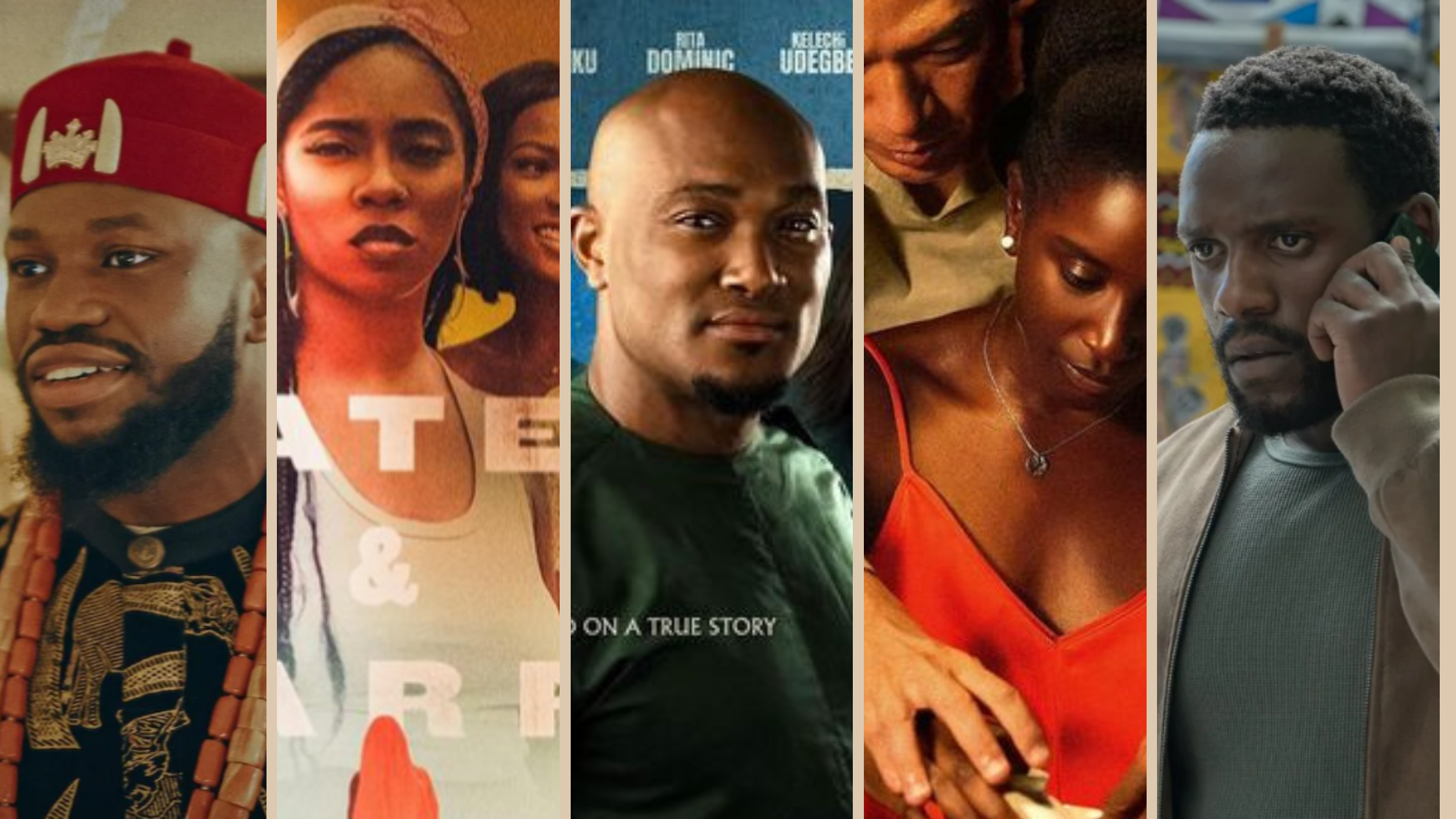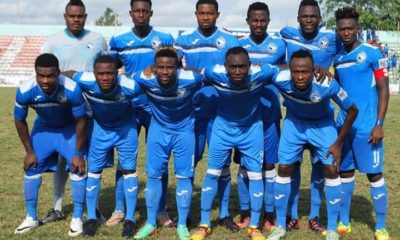Sports
Spotlight On 10 Exceptional African Female Soccer Players

It is 2020 and soccer continues to grow at an unprecedented rate. Sadly, female soccer players still don’t get as much attention as their male counterparts. Soccer for women in Africa has been in existence since the ’70s. However, the audience has not grown as much as the audience for male soccer. Nevertheless, several African countries across the continent have produced great female soccer players. Some of these players display their incredible skills and talents locally and internationally. Today we want to beam the spotlight on the top 10 exceptional African female soccer players.
1. Asisat Oshaola (Nigeria)

Asisat Oshaola is Africa’s best female soccer player. The Nigerian professional was born on October 9, 1994. She won the African Women’s Player of the Year four times and was named the best player and top goalscorer at the 2014 FIFA U-20 Women’s World Cup. Asisat Oshaola plays for the Nigerian national team, the Super Falcons. She is the second top scorer and the best player in the Super Falcons. Also, she has worn club jerseys for Liverpool ladies (2015) and Arsenal Ladies (2016). She is currently a player for FC Barcelona Femeni playing the forward position. In 2019, she was appointed the captain of Super Falcons.
2. Janine van Wyk (South Africa)

Janine van Wyk is a South African national and the founder of JVW Girls Football Development. Currently, she is playing for the top Scottish league, Glasgow City FC as a defender. Van Wyk represented her national team at the 2012 Summer Olympics, London. Being a record holder of the most capped player (male and female) in South Africa, van Wyk has 170 caps. Janine has also played for Monko Swallow Palace Super Falcons and Houston dash in the SA and represented SA in two Olympic Games.
3. Francisca Ordega (Nigeria)
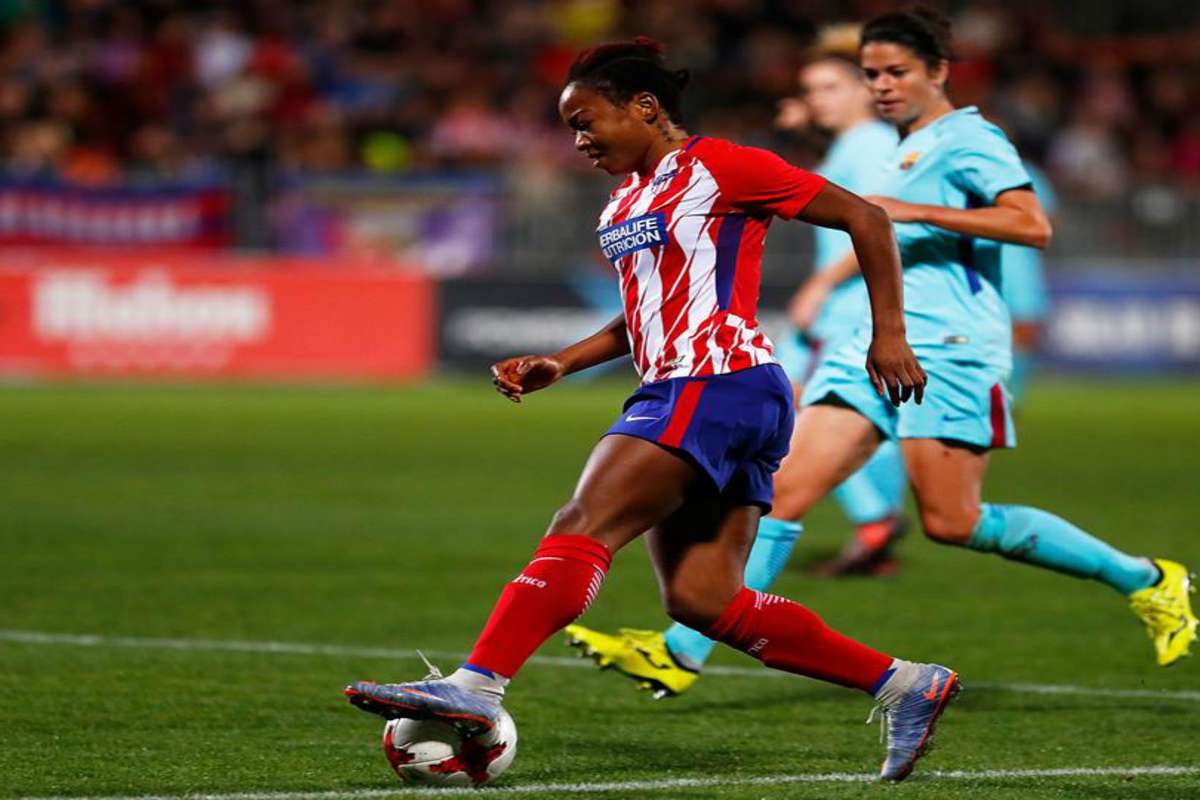
Francisca Ordega deserves a mention in the African best female soccer players list. She is a Nigerian striker who plays for a Chinese super league Shanghai Shenhua. She started her professional football career with Bayelsa Queen’s football Club in Nigeria. Francisca is currently on loan to Sydney FC and Atletico Madrid before moving back to Shanghai WFC for a year. She has represented her national team at U17 and U20 in FIFA women world cup 2011 and 2015. In 2018, she won the woman of the match award in Ghana at the Africa Women Cup of Nations. Ordega scored her first goal after joining a Swedish football club known as Pitea IF.
4. Thembi Kgatlana (South Africa)
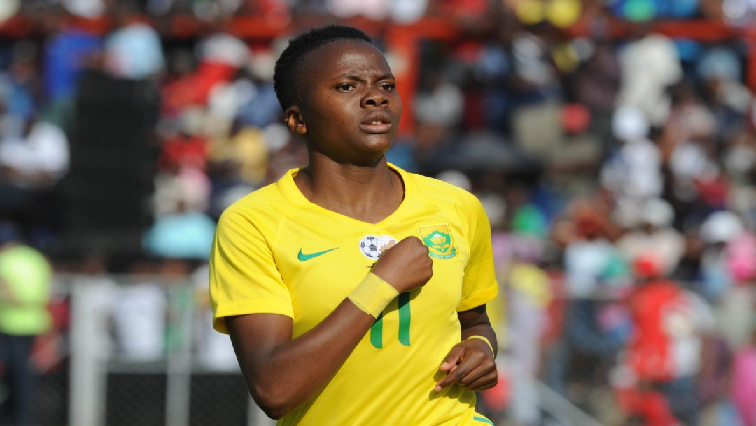
Thembi is currently playing the forward position for the Eibar club in Spain’s Primera Division. She played for her national team and became the highest goal scorer, and won the player of the tournament award. She scored the first-ever goal for South Africa in the 2019 FIFA women’s World Cup. Thembi also played for Houston Dash in 2018 and Beijing BG Phoenix FC in 2019. In Houston, she played alongside Janine van Wyk and Linda Motlhalo, both from South Africa. In 2018, Thembi won several individual awards including the best player in the Cyrus cup. She also won awards for African Women’s goal of the year and footballer of the year. Among her individual awards are the best player and top scorer in 2018. Thembi Kgatlana signed for Benfica early this year.
5. Gabrielle Onguene Aboudi (Cameroon)

Gabrielle plays the position of a striker for CSKA Moscow. She comes from Cameroon and previously played for Rossiyanka back in 2015. Her team won gold at All-Africa Games in Mozambique and she was instrumental to that victory. She became the best player and also helped her team score the vital goal at London Olympic Games.
6. Genoveva Anonman (Equatorial Guinea)

Hailing from Equatorial Guinea, Genoveva is a top scorer for the national team, which she has been a member for 16 years. She played as a forward and was the first foreigner to win the Bundesliga top scorer award. She scored 22 goals that season. Anonman was also a top scorer when she got signed for USV Jena. Seems her feet are full of goals. She has won the CAF Women’s Championship twice, both in 2008 and 2012.
7. Gaelle Enganamouit (Cameroon)

Gaelle is a forward player for Malaga CF. She is from Cameroon and is known for scoring the world’s fastest goal in female soccer’s history in just two seconds. Gaelle was the top goal scorer in the Swedish 2015 Damallsvenskan. However, she later got signed to Dallan Quan Jian Fc in the Year 2015. She won individual awards for being the top goalscorer in Damallsvenskan and African women football.
8. Doreen Nabwire (Kenya)
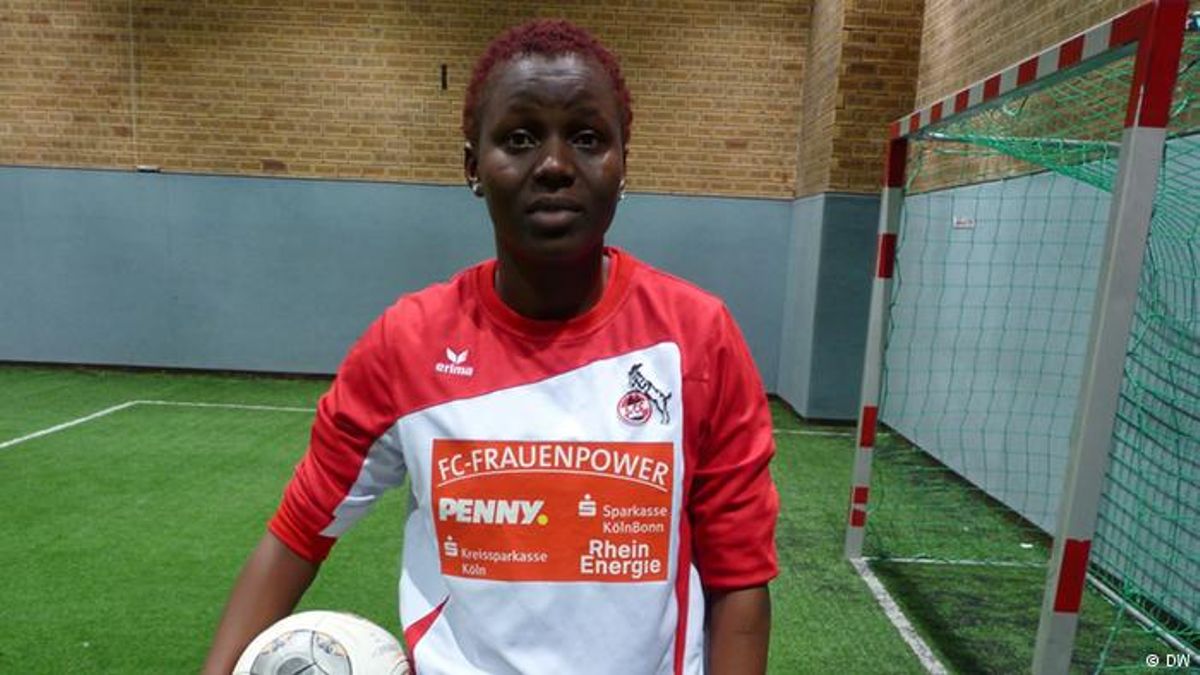
Doreen Nabwire is the first Kenyan female soccer player to play in the Frauen-Bundesliga, German women’s Football League. She is the founder of Girls Unlimited—a community-based organization in Mathare—where she supports girls who love soccer. She played for Kenya’s first professional women football club, Mathare United FC. In 2006 she became a world champion for FIFA street soccer. She became the top score for Werder Bremen in 2010 and a champion of Kenya’s women championship in 2002 and 2012.
9. Ngozi Okobi (Nigeria)
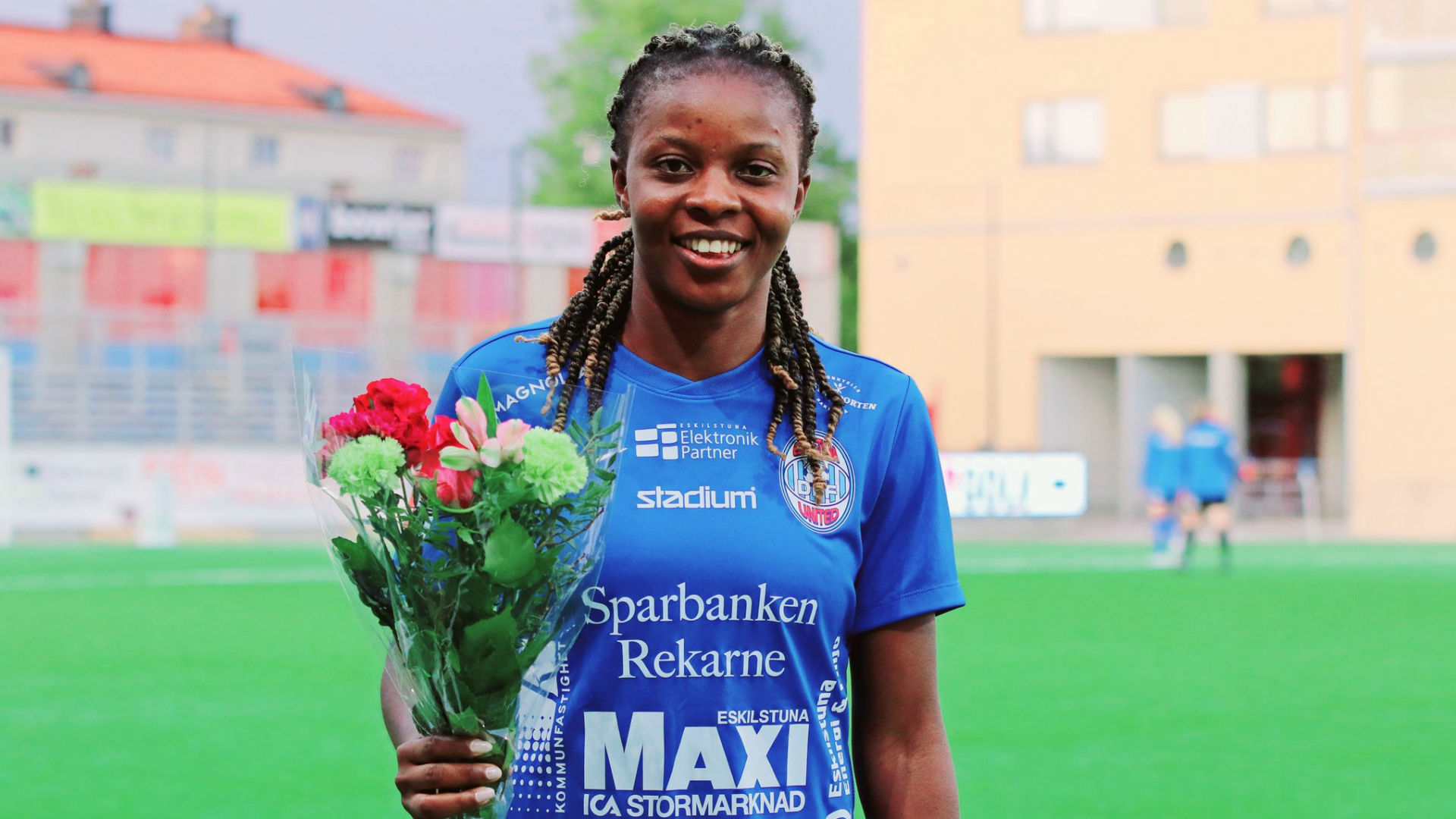
Ngozi Okobi is a professional female soccer player with the Super Falcons of Nigeria. However, she’s a versatile player who can play different positions on the field. She played for the Super Falcons in 2010, 2012, and 2014 African Women’s Championship. Currently, she is playing for Eskilstuna United as a midfielder.
10. Ange N’Guessan (Ivory Coast)

Ange is a female soccer player from Cote d’Ivoire playing the winger position. Her first appearance for the national team was on May 15, 2015. Currently, Ange is playing for Granadilla Tenerife. Previously, she had been playing for Gintra-Universitetas, FC Barcelona, among others. She has helped her team win many titles.
Conclusion
Over the years, soccer has been a game associated with masculinity. Female soccer players have proven that football is not just a male-dominated game anymore. Many women have risen above their limits to be among the best soccer players in the world. The growth and transition of soccer over the years has seen many European countries sponsoring and supporting female players, especially in African countries. We can’t wait for the day when an African female soccer team will lift the women’s World Cup. Is there any player we missed? Feel free to let us know in the comment box below.
Sports
New Dates Announced for AFCON 2025 in Morocco
Discover the newly announced dates for AFCON 2025 in Morocco. Get ready for Africa’s biggest soccer tournament and mark your calendars for the exciting matches ahead.


Morocco is set to host the Africa Cup of Nations (AFCON) for the second time, with the tournament now rescheduled to run from December 21, 2025, to January 18, 2026. This significant shift from the originally planned dates in June and July 2025 aligns with strategic considerations to avoid conflicts with major international football events, such as the FIFA Club World Cup and UEFA Champions League.
ALSO READ: A Historic First: Three East African Nations Team Up for AFCON 2027
The upcoming AFCON 2025 will see 24 teams compete in what promises to be a showcase of African football excellence. The CAF Executive Committee has also confirmed the dates for the CAF TotalEnergies Women’s Africa Cup of Nations (WAFCON), which will take place in Morocco from July 5 to July 26, 2025. This marks a pivotal moment in the growth of women’s football on the continent.
CAF President Dr. Patrice Motsepe expressed high expectations for the tournament, anticipating it to be the most successful AFCON in history. He acknowledged the complex discussions that led to the date changes and reiterated CAF’s commitment to advancing the interests of African players globally. Motsepe also praised the support of Morocco’s King Mohamed VI and the Fédération Royale Marocaine de Football (FRMF) in hosting these prestigious events.
FRMF President Fouzi Lekjaa emphasized Morocco’s readiness to provide the best conditions for the tournament, aiming to honor Africa through exemplary hospitality and organization.
The decision to move AFCON to the holiday season underscores a strategic effort to position the tournament uniquely in the global football calendar, setting the stage for an unprecedented celebration of African football.
Key Takeaways
- The 2025 AFCON will take place in Morocco from December 21, 2025, to January 18, 2026.
- This will be the second time Morocco has hosted the AFCON, with the previous edition held in 1988.
- The tournament was originally scheduled for June-July 2025 but was rescheduled to avoid conflicts with the FIFA Club World Cup and UEFA Champions League.
- The 2025 AFCON will feature a 24-team format, with Morocco as the sole guaranteed participant as the host nation.
- The qualifying draw for the tournament is set to take place on July 4, 2024, in Johannesburg.
AFCON 2025 Dates: Morocco to Host Premier African Football Tournament
Patrice Motsepe, heading the Confederation of African Football, is upbeat about the AFCON 2025’s impact. Drawing from a previous AFCON in the Ivory Coast, the tournament there saw CAF bag an impressive $80 million. This is a huge leap from the usual $4 million in profits. It highlights the AFCON’s rising appeal and significance within African football.
Being the host grants Morocco entry into the finals, ensuring preparation through rival matches before the main tournament. The final team selection will happen at the July 4 draw in Johannesburg, with 48 teams vying for 23 spots.

The 2025 AFCON’s buzz is palpable, yet it poses a few logistical challenges for CAF. They must reschedule the CHAN and tackle uncertainties around the AFL, a 24-team club proposition. These issues could impact local football clubs.
“The 2025 AFCON in Morocco will be the best AFCON in the history of this competition,” stated CAF president Patrice Motsepe.
The African football family is all eyes on AFCON 2025, waiting for a game-changer in the continent’s key football scene.
Navigating the Scheduling Challenges
For the 2025 Africa Cup of Nations (AFCON), organizers had to strategically plan to avoid overlapping with key football tournaments. Initially set for June-July, the AFCON moved to December-January. This shift avoided conflicts with the Club World Cup in the US and the UEFA Champions League in Europe.
This move was a first for the AFCON, changing its schedule from January-February to December-January. With the Champions League running till December 11, 2025, and not restarting until January 21, 2026, the AFCON games had a clear window.
Avoiding Clashes with Club World Cup and UEFA Champions League
Moving the AFCON was crucial to prevent overlaps with other significant football events. The Club World Cup, held from June 15 to July 13, 2025, in the US, necessitated this change.
Consideration was also given to the UEFA Champions League. Its last game was on December 11, 2025, with the next phase starting January 21, 2026. This ensured the AFCON had a clear timeframe for its matches.
The careful adjustment of the AFCON schedule to fit the global football calendar aimed to reduce conflicts. This planning works towards a smooth tournament for fans and players. It also shows the CAF’s dedication to the AFCON’s prosperity.
Impact on Premier League Clubs and African Players
The rescheduling of the 2025 Africa Cup of Nations (AFCON) is set to challenge Premier League clubs with African talents. Shifting the AFCON to December could clash with the Premier League’s bustling holiday season. This might lead to a jam-packed schedule for many clubs.
Initial plans suggested holding the tournament from July to mid-August to steer clear of major European seasons. Now, the Confederation of African Football (CAF) is mulling over moving it to later in 2025 or even early 2026.
This change troubles Premier League outfits, especially regarding their playing squads. Star athletes, such as Mohamed Salah, Andre Onana, and Thomas Partey, could see international duty in the AFCON. This might leave their clubs understaffed.
Another concern is FIFA’s regulation on player participations. This rule prohibits clubs from releasing the same player for more than one international final each year. Such a stipulation could impact athlete availability for both the World Cup and the AFCON in a single calendar year.
Furthermore, these scheduling shifts might alter the recruitment strategies of Premier League clubs. Take Arsenal, for instance. They foresee no player conflicts in December 2025, lessening the AFCON’s blow on their operations.
But, the AFCON’s new timing could disrupt plans for other clubs. They might have to tweak their rosters to manage the upcoming tournament.
Potential Conflicts with Release of Players During Busy Holiday Period
The AFCON’s proposed timing, amid late December 2025 and late January 2026, coincides with the festive rush in the Premier League. This scenario poses challenges for club managers. Simultaneously, the tournament overlaps with the USA-hosted FIFA Club World Cup, featuring 32 teams during the summer of 2025.
This situation has Premier League clubs worried. They must strike a balance between their local and international obligations.
Fifpro has initiated legal proceedings against FIFA, arguing over fixture-related decisions. The AFCON dates also sandwich between the expanded Champions League’s sixth and seventh fixture rounds. This further complicates the football calendar, affecting English football significantly. It could prompt a reevaluation of FIFA’s international call-up regulations.
Qualifiers and Participating Teams
Set in Morocco, the 2025 Africa Cup of Nations will gather top teams from Africa. A qualifying draw will take place on July 4, 2024, in Johannesburg. Morocco, as the host, secures its place in the 24-team finals.
52 CAF teams will compete for 23 spots in the 2025 AFCON through qualifiers. Teams will be grouped, and based on their performance, the top teams and the best third-placed ones will progress.
| Pot 1 | Pot 2 | Pot 3 | Pot 4 |
|---|---|---|---|
| Morocco, Senegal, Nigeria, Egypt, Ivory Coast, Tunisia, Algeria, Mali, Cameroon, South Africa, Burkina Faso, DR Congo | Cape Verde, Ghana, Guinea, Equatorial Guinea, Gabon, Zambia, Uganda, Angola, Benin, Mauritania, Namibia, Kenya | Madagascar, Mozambique, Congo, Togo, Libya, Guinea-Bissau, Comoros, Tanzania, Zimbabwe, Malawi, Sierra Leone, Sudan | Central African Republic, Niger, Gambia, Rwanda, Burundi, Ethiopia, Botswana, Eswatini, Lesotho, Liberia, South Sudan, Chad |
The seeding for the preliminaries will use the February 2024 FIFA World Ranking. Teams like Ivory Coast and Nigeria will likely be in Pot 1. The group stage begins on September 2, 2024.
The 2025 AFCON’s qualifying draw is eagerly awaited, aiming to fill 23 spots without Morocco’s need to qualify. The event will usher in a spirited journey for numerous teams aiming for success.
“The 2025 Africa Cup of Nations will be a historic event for African football, showcasing the best talent our continent has to offer. We are excited to welcome the world to Morocco and deliver a tournament that will captivate fans across the globe.”
– CAF President
Profitability and Revenue Generation for CAF
The Confederation of African Football (CAF) has seen a major rise in profitability due to the Africa Cup of Nations (AFCON). CAF president Patrice Motsepe stated the organization earned an astounding $80 million (€75 million) from the 2023 AFCON in Ivory Coast. This amount is notably higher than previous AFCONs, which averaged $4 million in profits.
Unlike the more sporadic European Championship and others, the AFCON occurs biennially. This regular schedule significantly contributes to CAF’s income, making it a cornerstone of their financial success.
Several factors contribute to the AFCON’s improved profitability. These include better sponsorship deals and broadcasting rights, along with the tournament’s continuous popularity among fans. Moreover, hosting in different African countries broadens CAF’s revenue streams and commercial opportunities.
The AFCON’s rising profitability underscores an increasing interest in African football. CAF’s strategic focus to boost the tournament’s financial impact has been successful. With Morocco hosting the 2025 AFCON, there’s an optimistic outlook for CAF’s future revenue streams.
“The AFCON is a crucial revenue stream for CAF, as it is held every two years, unlike the less frequent European Championship, Copa America, and Asian Cup.”
The AFCON’s success benefits not just CAF but also African football as a whole. The tournament’s increased revenue is vital for investing in grassroots, infrastructure, and talent programs. This investment is crucial for the growth of football across the continent.
Conclusion
Fans should prepare for thrills at the tournament in Morocco in 2025. CAF president Patrice Motsepe is sure it will be the best yet. The 2025 AFCON aims to be a standout event, drawing football lovers from Africa and the world.
FAQ
When will the 2025 Africa Cup of Nations (AFCON) take place?
The 2025 AFCON will take place in Morocco, running from December 21, 2025, to January 18, 2026.
Why was the AFCON 2025 tournament date changed?
Originally, the AFCON 2025 was set for June and July. It was rescheduled to December-January. This change was to prevent overlap with the Club World Cup’s kickoff in the U.S. and the UEFA Champions League in Europe.
What are the expectations for the AFCON 2025 in Morocco?
Patrice Motsepe, President of CAF, is optimistic. He anticipates the 2025 AFCON in Morocco to top all previous competitions, naming it the “best AFCON in this event’s history.”
How many teams will participate in the AFCON 2025?
In the 2025 AFCON, 24 teams will compete. Currently, 48 teams are fighting for these spots, with the final qualifying draw set for July 4 in Johannesburg.
How will the AFCON 2025 qualifying process work?
The 24-team tournament’s qualifying draw is planned for July 4 in Johannesburg. Teams will be divided into 12 groups. Each group will contest to secure a spot in the finals. Morocco automatically qualifies as the host nation.
What is the financial impact of the AFCON for CAF?
In 2023, the CAF profited million (€75 million) from the AFCON in the Ivory Coast. This marked a substantial increase from previous events, as announced by President Motsepe.
Basketball
The Triple-Double NBA Africa Startup Accelerator Fuels Innovation in Sports and Creativity
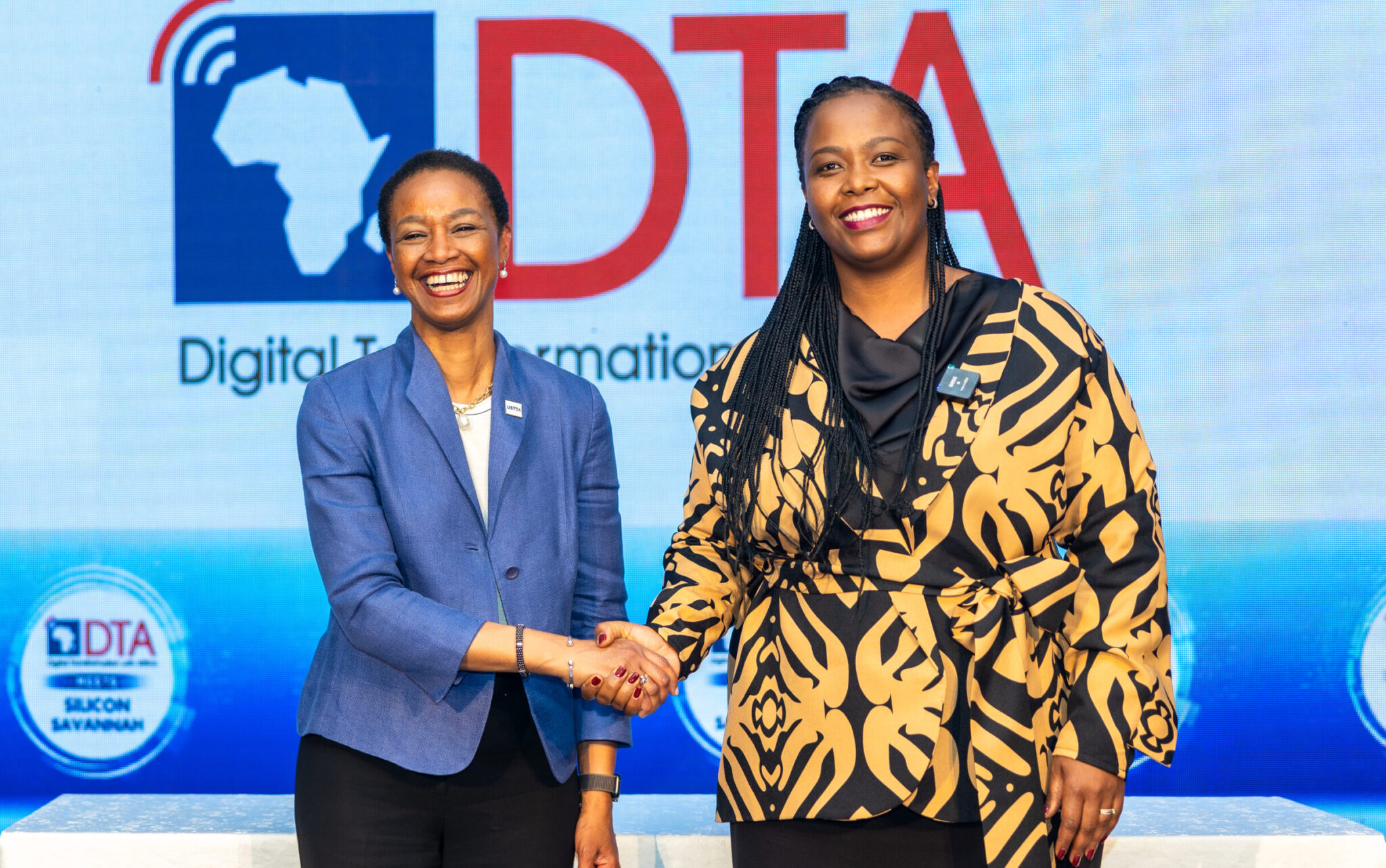
A New Frontier in African Sports and Innovation – In an exciting development for the African tech and sports landscape, NBA Africa has launched the Triple-Double: NBA Africa Startup Accelerator. This pioneering program is designed to nurture early-stage startups that are innovating in event management, ticketing, youth development, artificial intelligence, and digital marketing within the sports and creative sectors. As part of a broader effort to support and expand the African sports ecosystem, this initiative not only promises to shape the future of sports on the continent but also offers substantial growth opportunities for African entrepreneurs.

Bridging Gaps: Aligning with Global Digital Initiatives
The accelerator aligns seamlessly with President Biden’s Digital Transformation with Africa Initiative and the US Department of Commerce’s Africa strategy. This strategic alignment underscores a significant international interest in fostering technological advancements and digital entrepreneurship in Africa. By syncing with these powerful initiatives, the accelerator ensures that participating startups have a global stage and resources to scale their innovations effectively.
What’s on Offer: Capital, Mentorship, and More
The NBA Africa Startup Accelerator goes beyond just financial support; it offers a holistic mentorship program facilitated by NBA Africa, technology incubator ALX Ventures, and other key industry stakeholders. Scheduled to run until May 31, 2024, the program invites startups to present their innovative solutions and compete for a spot in an exclusive cohort of ten companies. These selected startups will benefit from expert guidance focusing on product development, business growth, and strategic market entry.
ALSO READ: 5 Reasons Why Africa’s Marriage With NBA Is A Sign Of Good Things To Come
A Spotlight Event: Demo Day in NYC
The journey culminates in a Demo Day set for September 2024 in New York City, where the startups will pitch their refined products and business models to a panel of global industry leaders. This event not only provides a platform for exposure but also serves as a critical networking opportunity. At the end of this day, four exceptional companies will be chosen to receive continued financial support, further mentorship opportunities, and the chance to collaborate on NBA Africa and Basketball Africa League (BAL) initiatives.

Impact and Influence: Beyond Business Growth
The implications of the NBA Africa Startup Accelerator extend far beyond immediate business benefits. By focusing on sectors such as youth development and AI, the initiative is poised to make significant impacts on the socio-economic fabric of African societies. These startups will drive technological adoption and innovation, creating new job opportunities and enhancing the sports and entertainment experiences across the continent.
NBA Game-Changer for African Innovation
As NBA Africa sets the stage with this accelerator, it’s not just about finding new talent or ideas—it’s about creating a sustainable impact that reverberates through the entirety of Africa’s sports and creative industries. For the visionary entrepreneurs of Africa, the Triple-Double: NBA Africa Startup Accelerator is not just an opportunity—it’s a portal to the future of sports and innovation on the continent.
ALSO READ: Joel Embiid Makes History as First Cameroonian Player to be Named NBA MVP
Seize the Opportunity
For startups looking to make a mark in the burgeoning sectors of sports and creativity in Africa, the clock is ticking. The deadline for applications is May 31, 2024. This is your chance to be part of a transformative journey that could set your venture on a path to global recognition and success. Apply now and be ready to play a pivotal role in shaping the future of African sports and innovation.
Soccer
Mali’s U-17 World Cup Glory: How Mamadou Doumbia Made the Difference
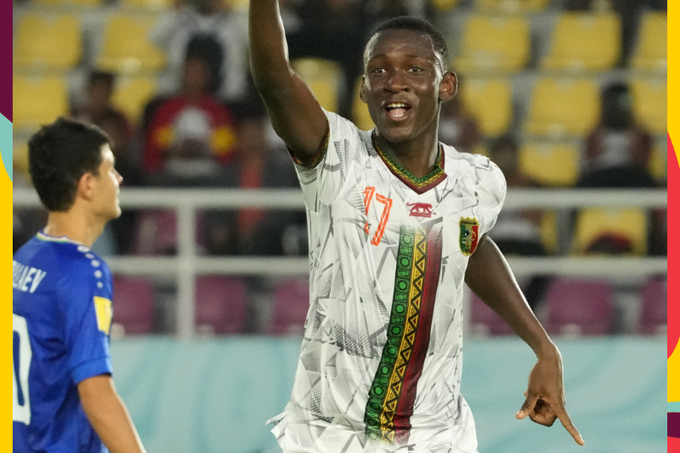
The FIFA U-17 World Cup isn’t just any tournament; it’s a big deal in youth football. ?⚽ This is where tomorrow’s stars get their first taste of international fame, playing against the best young talents from around the globe. It’s where skills are honed, dreams are nurtured, and future legends are born.
Introduction to Mali’s Team and Their Journey in the Tournament
Now, let’s talk about Mali’s team. They’ve always brought their A-game to the FIFA U-17 World Cup, showcasing incredible talent and a deep passion for the game. This year, they’ve outdone themselves, playing with a mix of skill, strategy, and heart that’s won them fans worldwide.
ALSO READ: The Liptako-Gourma Charter: An Unexpected Alliance Of 3 African Military Regimes
Focus on Mamadou Doumbia as a Key Player for Mali
Enter Mamadou Doumbia – Mali’s shining star in this tournament. He’s not just any player; he’s a game-changer, a force to be reckoned with on the field. Doumbia has been pivotal in Mali’s journey so far, turning heads with his skill, agility, and sheer determination. Let’s dive into how this young talent is making waves in the FIFA U-17 World Cup and putting Mali on the football map.
Who is Mamadou Doumbia?

Background Information on Mamadou Doumbia
Mamadou Doumbia isn’t just a name on a roster; he’s a rising star in the world of football. Born and raised in Mali, Doumbia fell in love with football at a young age. He quickly became known in his local community for his exceptional skills and passion for the game. ??⚽
Doumbia’s Early Football Career and Achievements
From kicking a ball in local fields to dominating in youth leagues, Doumbia’s journey has been nothing short of inspirational. He’s been a standout player from the get-go, known for his quick feet, sharp mind, and ability to read the game like a seasoned pro. His early career is peppered with accolades, including leading his school team to regional victories and being named ‘Player of the Tournament’ in local youth competitions.
His Role and Position in the Mali U-17 Team
In the Mali U-17 team, Doumbia is the player everyone’s talking about. He plays as a midfielder, but he’s not just any midfielder. He’s the heart of the team – creating opportunities, setting up goals, and keeping the play moving. His role extends beyond just scoring; he’s a leader on the field, guiding his team and inspiring confidence in his teammates. With Mamadou Doumbia on the field, Mali’s U-17 team transforms into an even more formidable force.
ALSO READ: A Historic First: Three East African Nations Team Up for AFCON 2027
Mali’s Journey in the U-17 World Cup
Overview of Mali’s Performance in the Tournament
Mali’s run in the FIFA U-17 World Cup has been nothing short of impressive. Right from the start, they’ve shown they’re not just here to participate; they’re here to compete. With a mix of solid defense, creative midfield play, and sharp attack, they’ve caught the eye of fans and critics alike. ?
Highlights of Mali’s Matches Leading to the Key Game
Let’s rewind a bit and look at how Mali got to this key game:
- First Match: Mali came out strong, showing off their skills and teamwork, bagging a convincing win.
- Second Match: This was a tougher challenge, but Mali held their ground, displaying resilience and tactical smarts.
- Lead-Up to the Key Game: By now, Mali had built a reputation for being tough opponents, and the excitement for their next match was sky-high.
The Anticipation and Expectations Placed on Doumbia
All eyes were on Mamadou Doumbia. The expectations were massive, but so was the belief in his ability. Fans and teammates alike knew that Doumbia could be the game-changer Mali needed. He wasn’t just expected to play well; he was expected to lead, to inspire, and to make the difference when it mattered the most. And guess what? He was more than up for the challenge!
The Pivotal Match: Mamadou Doumbia’s Role

Detailed Account of Mali’s Crucial Match in the Tournament
Mali’s pivotal match in the FIFA U-17 World Cup was a rollercoaster of emotions. The stakes were high, the crowd was buzzing, and the anticipation was through the roof. From the first whistle, it was clear this wasn’t just any game. Mali, with Doumbia in the lineup, was ready to make a statement.
Analysis of Doumbia’s Performance in the Game
Mamadou Doumbia didn’t just play in this match; he owned it. His performance was a masterclass in midfield excellence.
Key Moments and Plays by Doumbia
- The Game-Changing Assist: Doumbia’s vision on the field led to a stunning assist that broke the deadlock.
- Defensive Brilliance: He wasn’t just about offense. Doumbia made crucial tackles and interceptions, stopping the opposition in their tracks.
- The Energy Booster: Whenever the team needed a lift, Doumbia was there, driving forward and motivating his teammates.
Doumbia’s Contribution to the Team’s Strategy
Doumbia’s role was pivotal to Mali’s strategy. He was the link between defense and attack, ensuring the ball kept moving and creating chances. His ability to control the pace of the game and make precise passes was crucial in executing Mali’s game plan.
The Turning Points in the Match Influenced by Doumbia
Doumbia’s influence on the match was undeniable. His key plays and strategic thinking led to turning points that swung the game in Mali’s favor. Whether it was a well-timed pass, a crucial interception, or just his relentless energy, Doumbia was at the heart of Mali’s pivotal moments in the game.
Impact of Doumbia on Mali’s Success
Discussion on How Doumbia’s Skills Positively Affected the Team
Mamadou Doumbia’s impact on the Mali team in the FIFA U-17 World Cup can’t be overstated. His skills did more than add flair to the game; they lifted the entire team.
- Skillful Playmaking: Doumbia’s ability to create opportunities and set up goals was a game-changer for Mali.
- Consistent Performance: His consistent high-level play brought stability and confidence to the team.
- Versatility on the Field: Doumbia’s adaptability in various midfield roles made him invaluable, allowing Mali to be flexible in their tactics.
Doumbia’s Leadership and Influence On and Off the Field
It’s not just what Doumbia does with the ball that makes him special; it’s also his presence on and off the field.
- Leading by Example: Doumbia leads not just with words but with actions. His dedication and work ethic are contagious, inspiring his teammates to give their best.
- Moral Support: He’s known for boosting the team’s morale, keeping spirits high even in challenging moments.
- Role Model: Off the field, Doumbia’s attitude and professionalism set a positive example for his teammates and young fans alike.
ALSO READ: Francis Ngannou vs Tyson Fury: The Outcome No One Saw Coming
Comparing Team Performance With and Without Doumbia’s Involvement
The difference in Mali’s performance with and without Doumbia is like night and day.
- With Doumbia: The team plays with more cohesion and confidence. There’s a noticeable increase in creative plays and scoring opportunities.
- Without Doumbia: The team lacks the same level of dynamism and control in the midfield, which can affect overall performance.
In short, Mamadou Doumbia is not just a player; he’s a catalyst for Mali’s success in the FIFA U-17 World Cup. His skills, leadership, and influence are integral to the team’s achievements and their journey in the tournament.
Broader Impact of Doumbia’s Performance
The Significance of Doumbia’s Performance for Mali’s Football
Mamadou Doumbia’s performance in the FIFA U-17 World Cup is more than just personal success; it’s a big win for Mali’s football as a whole.
- Raising Standards: Doumbia sets a high bar for what young players in Mali can achieve, showing that world-class talent can come from their homeland.
- Boosting National Pride: His success brings a sense of pride and excitement to Mali’s football fans, igniting a passion for the sport across the nation.
- Enhancing Mali’s Football Reputation: Internationally, Doumbia’s performance puts Mali on the map as a breeding ground for exceptional football talent.
How Doumbia’s Success Could Inspire Future Generations in Mali
Doumbia is not just a player; he’s a source of inspiration for kids who dream of playing football.
- Role Model: His journey shows that with hard work and dedication, even kids from small towns in Mali can make it big on the world stage.
- Motivation for Youth: Doumbia’s achievements motivate young players in Mali to pursue their football dreams and believe in their potential.
- Increasing Interest in Football: His success could lead to more children taking up the sport, boosting the development of football at the grassroots level.
The Potential Future for Mamadou Doumbia in Football
Looking ahead, the sky’s the limit for Mamadou Doumbia.
- Club Career: Doumbia has the talent to catch the eye of top football clubs around the world, opening doors to a successful professional career.
- National Team Prospects: His skills make him a strong candidate for Mali’s senior national team in the future.
- Long-Term Impact: Doumbia has the potential not just to be a great player, but also a future leader and influencer in the world of football.
Mamadou Doumbia’s performance in the FIFA U-17 World Cup isn’t just a personal triumph; it’s a beacon of hope and inspiration for Mali’s football community and a preview of the bright future he could have in the sport.
ALSO READ: Celebrating Success: Mali and Morocco’s Impressive Start at FIFA U-17 World Cup
Conclusion
Recap of Mamadou Doumbia’s Contribution to Mali’s U-17 World Cup Journey
Mamadou Doumbia, remember the name! He’s been a standout player in Mali’s incredible journey in the FIFA U-17 World Cup. ? From making crucial plays to leading the team with his dynamic presence, Doumbia has shown he’s not just a player, but a game-changer. His skills, determination, and leadership have been key factors in Mali’s success in the tournament.
Reflection on Doumbia’s Potential Future Impact in Football
Looking ahead, the future seems bright for Mamadou Doumbia. With his level of talent, he’s poised to make significant waves in the football world. We can expect to see him grow, not just as a player, but as an ambassador of Mali’s football, inspiring a new generation of players and possibly leading Mali to new heights on the global football stage.
Final Thoughts on the Importance of Individual Talent in Team Sports
Doumbia’s journey is a perfect example of how individual talent can uplift an entire team. It’s players like him who bring magic to the field, inspiring their teammates and turning a group of players into a cohesive, formidable team. His story reminds us that while football is a team sport, it’s often individual brilliance that makes the difference, lights up the game, and writes history.
Mamadou Doumbia’s role in Mali’s U-17 World Cup adventure is a testament to the power of individual talent and the exciting possibilities it brings to team sports. Here’s to watching his journey continue, on and off the field! ⚽?
-

 Style8 months ago
Style8 months ago25 Fashion Fabulous African Style Outfits for Work
-

 Citizenship2 years ago
Citizenship2 years ago12 Surprising African Countries That Allow Dual Citizenship By Marriage
-

 Style7 years ago
Style7 years ago35 Fabulous African Style Tops And The Afronistas Who Rock Them
-

 African Food9 months ago
African Food9 months agoThe Ultimate Guide to Making Abacha and Ugba (African Salad)
-

 Hair3 years ago
Hair3 years ago25 Gorgeous Natural Hairstyles for Work
-
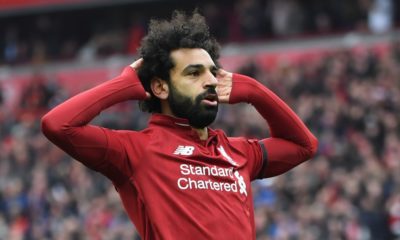
 Sports6 years ago
Sports6 years agoTop 20 African Soccer Players To Watch In 2019
-

 African Food9 months ago
African Food9 months ago7 Of The Best African Grilled Fish Recipes To Try This Summer
-

 African Food9 months ago
African Food9 months agoAfrican Fish Roll (Fish pie)
Report
Block Member?
Please confirm you want to block this member.
You will no longer be able to:
- See blocked member's posts
- Mention this member in posts
- Invite this member to groups
- Message this member
- Add this member as a connection
Please note: This action will also remove this member from your connections and send a report to the site admin. Please allow a few minutes for this process to complete.
Report
Report
Block Member?
Please confirm you want to block this member.
You will no longer be able to:
- See blocked member's posts
- Mention this member in posts
- Invite this member to groups
- Message this member
- Add this member as a connection
Please note: This action will also remove this member from your connections and send a report to the site admin. Please allow a few minutes for this process to complete.




